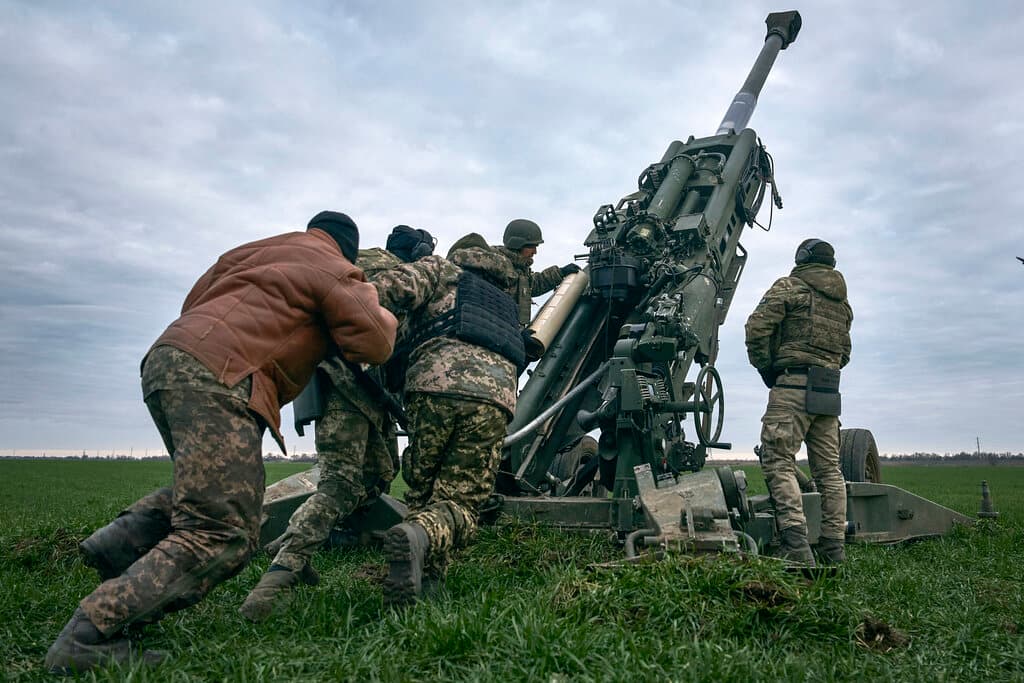As Russia’s Nuclear Saber-Rattling Increases, So Does Its Isolation
Even its drone supplier and putative ally in sowing regional chaos, Iran, has taken some steps back from the Russian stage.

It is difficult to give Dmitry Medvedev credit for much, but the former Russian president who now heads the Kremlin’s security council does reliably demonstrate he knows how to generate headlines. He can do that with predictions that mix fallacy with false prophecy or by dangling the threat of nuclear war, as he did Thursday.
Ahead of a meeting of Western leaders Friday at the Ramstein air base in Germany, at which more military aid for Ukraine will be on the agenda, Mr. Medvedev stated that “a nuclear power losing in a conventional war can provoke the outbreak of a nuclear war.”
The statement, which Mr. Medvedev posted to his Telegram channel, did not come out of the blue but was rather his idea of a riposte to what he perceived to be certain political machinations at the annual economic parley at Davos. There, he said, “underdeveloped [Western] political party goers repeat like a mantra: ‘To achieve peace, Russia must lose.’” Characterizing the Davos forum participants as “wretches,” he deemed it an “elementary conclusion” that should Moscow’s invasion of Ukraine fail and Vladimir Putin fall, a global nuclear war could by his logic ensue.
On the same day, the somewhat more level-headed Kremlin spokesman, Dmitry Peskov, evoked the risk of a more generalized escalation should NATO supply Ukraine with weapons that can strike territory inside Russia. “Potentially, this is extremely dangerous, it will mean bringing the conflict to a whole new level, which, of course, will not bode well from the point of view of global and pan-European security,” Mr. Peskov told reporters.
The sentiment was shared by Moscow’s ambassador to Washington, Anatoly Antonov, who said that Russia would not hesitate to retaliate should Ukraine use Western-supplied weapons to launch attacks either against Russia or the Russian-occupied Crimean peninsula. “It should become obvious to everyone: No matter what weapons the Americans or NATO supply to the Zelensky regime, we will destroy it,” Mr. Antonov said.
Fighting words these are, but do they amount to much more than more of the same? After all, Mr. Putin has almost ritually dangled the prospect of nuclear confrontation, if only obliquely, since the earliest days of the war. As the New York Times reported this week, “fears” in the Biden administration that the Kremlin could use a tactical nuclear weapon to retaliate for attacks against Crimea “have dimmed.”
While American officials say there is still some risk, it increasingly looks like the uppermost members of the Russian military echelon are clinging to Cold War-style nuclear rhetoric, possibly to put European countries like Germany and Italy off ramping up their militaries’ contributions to the Ukraine war effort. On closer inspection, it is the language of the wolf backed into a corner.
A lonely corner it is shaping up to be. Germany’s finance minister, Christian Lindner, told the BBC that his country is no longer dependent on Russian imports for its energy supply. The view of Moscow from Paris, too, has narrowed; President Macron is caught up in unprecedented labor unrest, and at risk of becoming even more of a global laughing stock has largely given up on his efforts to tame Mr. Putin by telephone. Sources say that Monsieur Macron is now chiefly concerned with keeping Ukraine’s Zaporizhzhia nuclear power plant out of harm’s way.
Yet Moscow has more cause for concern. Its drone supplier and putative ally in sowing regional chaos, Iran, has taken some steps back from the Russian stage. The Islamic Republic’s foreign minister, Hossein Amir-Abdollahian, said that Tehran does not recognize Russian-occupied Crimea, the so-called people’s republics of Luhansk and Donetsk, or the Kherson and Zaporizhzhia regions of Ukraine as parts of Russia.
Despite maintaining that Iran has “excellent relations” with Russia, the foreign minister also said that “the conflict in Ukraine is not a solution,” and that Iran recognizes the sovereignty and territorial integrity of Ukraine.
There are also whispers in the European press that Communist China has conveyed to the G7 countries that its ability to influence Mr. Putin’s behavior should not be overestimated. Could it be that Beijing is taking the long view – the one that sees Ukraine’s victory over its oppressor as a matter of not if, but when?
More clear is that the battle on the ground, between Russian and Ukrainian soldiers, is set to intensify before spring, and what really worries the Kremlin is that Ukraine could soon have the tools it needs to give it the edge. Both more bloodshed on the ground and more howling but likely hollow Russian rhetoric can be expected.

